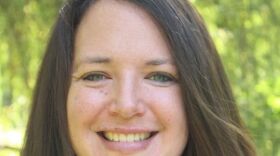
How'd You Think of That?
How do the unique ways that every person thinks affect the work they do – especially in STEM fields? How do we create an education and early career system that recognizes and takes advantage of every individual’s skill set, experiences, and perspective? In a new podcast series “How’d You Think Of That” with Temple Grandin, we delve into these questions with STEM professionals and learn about their important work and the benefit of a multifaceted approach to STEM education. The show originated with the STEM Action Center.
-
Elizabeth Streb is a MacArthur Genius Award-winner, Guggenheim Fellow, and recipient of Doris Duke Artist Award and US Artist Award, Elizabeth Streb is founder of the STREB Extreme Action Company and the STREB Lab for Action Mechanics where children and adults experimentation in her unique technique, PopAction.
-
Matthew Wappett is executive director of the Utah State University Institute for Disability, Research, Policy, and Practice. Grandin and Wappett discuss the institute's accomplishments and ongoing efforts to create a more inclusive society and education system.
-
Grandin and Banfield discuss the importance of checking sources and designing scientific experiments that can be replicated. They also discuss the growing influence of AI on education and the increasing value of hands-on learning with projects like GRRATE (Guitars, Robotics, Rocketry Advanced Technical Education).
-
In this episode, we peek into the world of veterinary science and medicine with Dr. Tess Guy, associate veterinarian at the Grove Veterinary Clinic in Newport, Oregon. Dr. Guy didn’t take a typical path to veterinary medicine, if there is such one. A note of caution, this episode contains a story about a suicide. If you or someone you know is in emotional distress or suicidal crisis, please call the Suicide and Crisis Lifeline at 988 or go to https://988lifeline.org.
-
The story of North America's first vertical hydroponic greenhouse that not only grows vegetables, but people's abilities too.An accomplished architect by training, Nona Yehia pioneered a way to feed an entire community with fresh produce, while also providing employment for people with physical and/or intellectual disabilities. She accomplished this alongside her co-founder Caroline Croft-Estay. Yehia conceived the company based on her experiences growing up with a brother with developmental disabilities, love of fresh and local food, obsession with great design and long-standing community involvement. Her organic connection to all aspects of the enterprise continues to fuel Nona’s insight into the business and her dynamic leadership style has led to her recognition as a CNN Champion of Change and Vertical Harvest’s inclusion on Fast Company’s World Changing Ideas List and as a finalist for their Best Places to Work for Innovators - Diverse Innovators Award.
-
Nalini Nadkarni is an ecologist who studies rainforest canopies and their disturbances. In addition to her research, Dr. Nadkarni pioneered the Science in Prisons project, which brings science education and conservation projects to incarcerated individuals. She is also a professor of Biology at the University of Utah.
-
Temple Grandin talks to cybersecurity expert Diego Tibaquirá about the increasing demand to fill cybersecurity jobs and the challenges of balancing cyber security and convenience in a digital world filled with hackers.
-
Sara Freeman, an Assistant Professor Neurobiology at Utah State University, studies the biological underpinnings of social behavior and monogamy. Studying social behavior in a variety of species helps scientists better understand the core of the social brain, and how neurological circuits work for humans.
-
Ruthe Farmer breaks through barriers. She is the founder and CEO of the Last Mile Education Fund . According to its website, it invests in a broader group of students already committed to STEM fields and provides support for challenges they face beyond their control, fostering the next generation of innovators. Farmer and Grandin discuss equity in education and the advice they would give to young people starting careers.
-
Temple Grandin and David Sands, founder of the Toothpick Project and retired professor of plant pathology (Montana State University) are both problem solvers and trailblazers. That’s just what they do naturally. Through their own life experiences, Grandin and Sands discuss how to help make the education system more amenable to all kinds of minds and skillsets.











